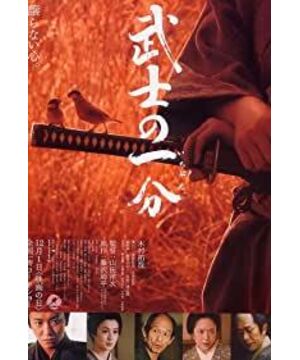Regarding the director of this film, in fact, I was not familiar with it before, but only knew that he was a master. Only now did I know that the "Twilight Kiyobei" that I liked before is also his work, and together with "Hidden Sword and Ghost Claw", it is called the "Samurai Trilogy". Looking back earlier, the super touching "Call of the Distant Mountain" and "The Yellow Handkerchief of Happiness" were also his works, as well as "The Story of Tora Jiro". But I really like him is his samurai works, period dramas are king~~~
"Twilight Qingbingwei" and "Samurai One Point" tell the story of a lower-level samurai, who has superb skills but can only do something very sloppy. It is very similar to the current college students who may learn a lot when they go to college, but they are really useless in society. What Mimura Xinzhihan did was to test the poison for the lord. He himself was tired of this life, but he was poisoned and blinded when he was about to resign.
Well, then life is completely lost. It's like a college student. Once you can't find a job, you can't find a job, and you can't afford to do some lowly work. So he was depressed at home all day, until he knew that his wife was being abused outside, he worked hard to practice martial arts, and finally took revenge.
Like most period dramas, the story will have a long foreshadowing ahead, which will build up Mimura's anger little by little. After finally learning that his wife was completely played with, the anger broke out at the highest point. Twilight Kiyobei also used this style. The director did not make the front tiling very boring, but expressed it with a feeling of spring flowers, autumn moon and wind. When Sanshu was poisoned in the early summer rain, the doctor told about the hurricane when it was incurable, the fireflies at night when he was enjoying the cool with his wife, and the autumn rain after driving his wife out of the house, the wild sand during a duel, and the fallen leaves after reuniting with Jiadai. All of this performance comes naturally. One detail is worth noting. When the family was discussing how to make a living in the future of Mimura, everyone in the room was shaking their fans violently, only Kayo sat there quietly. When everyone finally decided to let Kayo go to Gushimamura, they were relieved, as if a breeze was blowing. The Japanese have a strong ability to use the environment to set off the atmosphere, although sometimes they do it very exaggeratedly. For example, the environment in Kitano Takeshi's "Dolls" is no longer used to set off the atmosphere. It has completely become the protagonist, making the story look empty. At this point, the use of Imperial Laws is also vivid. Yamazaki walked over a bridge with a lantern at night, and when he bent down to tie his shoelaces, the lamp was blown out by a gust of wind, followed by a fight with the assassin. This is a plot that I like very much because these actions are connected together in a very orderly manner only by the gust of wind, which is cool.
When it comes to Japanese etiquette, samurai etiquette is extremely strict, often cutting the belly for a trivial matter. In fact, in this film, I think Mimura and Kayo are also deviant in the end. In the case of Mimura's seafood poisoning, the samurai in charge of the imperial kitchen had to cut his abdomen to apologize. In the duel with Mimura, Shimamura lost an arm and had to cut his abdomen to maintain the dignity of a high-ranking samurai. Here, Kayo was found out after cheating on her husband. She did not die of shame but chose to leave after her husband divorced her. Mimura did not surrender after her duel with Shimamura. I think it's all about love, because I know that I have to rely on each other to survive, so I have to endure it all the time. Many of the Japanese middle- and lower-level samurai are extremely affectionate, and most of them are underappreciated. Usually they can only support the samurai's face in front of their wives, and at critical times, they can do everything for women. This is why most of the wives of samurai can become typical good wives and good mothers.
Finally, let's talk about Takuya Kimura's performance. Well, it's cool as always~~ Takuya Kimura was born with a bitter face, but it is also a face that is born with love~~~
One point: face, dignity.
View more about Love and Honor reviews











